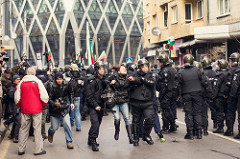clear

source:
George Chelebiev / Flickr
The governments are failing to bring in justice, economic growth and employment, social inclusion and functioning services to broad ranges of public. People fear of the Unknown and for many immigrants and refugees fueled by MidEast unrests are the sources of the unknown.
clear
 Eduard Marček
7 years, 2 months ago
Eduard Marček
7 years, 2 months ago
Putin is an important figure in all of this. He's a beacon to those on left and right who wish to decouple their countries from US-centric economic policies. For those on the far right, they also see Putin as a strong man opposed to western decadance - an agenda which fits in with Russian and far right homophobia, and an outlook which is against women. Russia's military action against Ukraine also strikes a chord with those on the far right, who like their leaders to engage in muscular displays of power. Across Erope, parties from Golden Dawn in Greece to Vlaams Belang in Belgium and Forca Nuova in Italy all talk about Putin in similarly glowing terms. It's not far from there to theories that Russia is supporting such parties - in 2014 Marine le Pen admitted that her Front Nationale borrowed 9m Euros from the Kremlin-linked First Czech Russian Bank. Media power is also important in this picture, and Britain's UKIP figurehead Nigel Farage is a frequent guest on Russia Today, where his criticism of the EU is strident but he never has a bad word to say about Russia. Russia might not be creating European extremism, but certainly does everything it can to support it.
clear
In the US and UK there is a lot of talk about the 'left behinds', people who haven't benefited from the last three decades of Neoliberal growth in these countries. I think this has a lot to it but also part of the picture is the failure of left wing parties, whose stated intention is to look after the less well off, to redress the conditions of these people when given their chance in government (13 years of the Labour party in the UK, 16 of the Democrats in the US). Equally, when the parties of the right have been tring to secure votes from swing voters and poorer voters, who are unlikely to benefit from their policies, they have often reverted to talking about immigration, threat of crime, abortion and social reform (gay marriage etc) to win votes, which in many ways has pushed the argument on such social issues ever further to the right with eac succesive election.
It would be unfair to exclude the media from their impsct on cheapening the discourse too. Right wing talk radio has exploded in the US over the last thirty years, being a primary source of news for some voters. Fox News has aso lent credence to some of talk radios most aggressive stars, a well as ideas. The explosion of ideas on the internet has pushed the opinions available ever further, Breitbart leading the charge right, accompanied by huge fringe sites like InfoWars. In the UK the media is more heavily regulated, but the newspapers are heavily skewed to the right and have effectively pushed public opinion on many subjects, particularly Europe. Largely these papers have supported the Conservative party but their attitudes have very much benefited the further right UKIP party, amongst other fringe parties.
 0
0
clear
 Andrew Tildesley
6 years, 11 months ago
Andrew Tildesley
6 years, 11 months ago
Undoubtedly, we all know the role France has historically assumed as standard bearer of western secular liberalism has also put the nation in the spotlight. Islamic extremists may see the US as a source of moral decadence and economic exploitation, but France is seen as an atheist power which is both defending western ideals such as human rights, free speech and democracy and, in the eyes of jihadis, trying to impose them on the Islamic world.
The first big militant attack in France in recent years came earlier however, in 2012, and targeted soldiers and the Jewish community. The next major attack was against the offices of Charlie Hebdo, a satirical magazine which had published controversial cartoons of the prophet Muhammad, deemed insulting by many Muslims. Then came November’s Isis-organised strike against a concert hall, bars and a football stadium – all representative of French life. Finally there is an attack on Bastille Day, with all the history and values it represents.
Partly for reasons of geography, as well as history, France does face a larger problem than some other European countries of individuals leaving its country to go to Syria or Iraq to fight for ISIS, and then returning. But it is hardly unique in the scale of this problem.
Continental Europe has a specific additional problem that is not as widely shared in the United Kingdom or the United States: Its criminal networks largely overlap with its extremist and/or terrorist networks. This point may be irrelevant to the Nice attack, but more widely, extremists in France or Belgium can make use of illicit channels for moving people, money, and weapons that are less available to would-be jihadis in places like the U.K.
 0
0
clear
 Wafa Benizid
6 years, 11 months ago
Wafa Benizid
6 years, 11 months ago
The rise of social media has propelled right-wing ideology, since the right knows that its days are numbered
 0
0
clear

 AdrianR
AdrianR

Moderator's comment:
testing minister comment